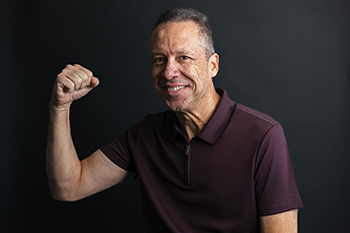Colon Cancer Survivor
Keep a positive mindset to beat cancer

Comprehensive biomarker testing guided Michael Stern’s doctor in choosing the best treatment for his Stage IV colon cancer. Next-generation sequencing of multiple genes showed he had a mutation in the KRAS gene. Michael recommends other patients have biomarker testing, too, and he shares his optimism and support with other survivors as an ambassador for Fight Colorectal Cancer.
Symptoms began about a year before I had a colonoscopy. I thought they were due to my diet so I put off having a colonoscopy. Truthfully, I was also afraid of the procedure. Looking back, I wish I had not waited. Originally determined to be Stage II colon cancer, my diagnosis was changed to Stage IV after the test results were re-examined.
I felt like the world suddenly stopped. I thought about what I would do to prepare to leave my family. I wondered what I would say to my kids and whether I’d ever see them grow up and have families of their own. It was one of the darkest times in my life. But a few weeks later, I came to grips with the diagnosis and chose to fight.
After the diagnosis, I asked my good friends to recommend the top colorectal surgeons and oncologists they knew. I wanted the best. The oncologist I chose from their recommendations was amazing. He had excellent reviews from other patients, and I appreciated his bedside manner and overall knowledge of colon cancer. I trust him 100 percent.
I also relied on the support of my wife. She is my rock. I wouldn’t have made it through without her. She helped pull me out of that dark hole and gave me the will to fight. She went to all of the appointments with me and helped make sense of what the doctor was saying. So much of it sounded like a foreign language to me.
The first step was surgery. I hoped for the best, which was for the surgeon to simply remove all of the cancer. However, I woke up with a temporary ileostomy bag. I was devastated. The surgeon had to take out more of my colon than he initially thought because the cancer was more aggressive than expected. He recommended the tumor be tested for mutations with comprehensive biomarker testing. I didn’t know what that was, but I didn’t question him. We waited two to three weeks for the results before starting any further treatment in case the information changed the treatment strategy.
In the meantime, it was a struggle to get the insurance to pay for the biomarker testing. At one point, my doctor had a peer-to-peer conversation with them to explain why this testing was necessary and that it was not an “elective” procedure. It also made an already stressful time more stressful. Luckily, my doctor fought for me to get the testing covered, and he succeeded.
The testing included next-generation sequencing of the tumor, which looked at multiple genes. Results showed I had a KRAS mutation. My oncologist explained that meant certain chemotherapies would be better at treating my colorectal cancer than others. I’m so grateful that I had the testing. He started me on a specific chemotherapy regimen with multiple drugs.
About eight months after the surgery, I was able to have my ileostomy reversed, which was a relief. I finished chemotherapy and was declared no evidence of disease (NED).
Unfortunately, about a year and half later, the cancer returned. The relapse meant I needed surgery to remove my colon and rectum, have a permanent ileostomy and start another chemotherapy regimen.
It was a lot, but I chose to keep a positive attitude because that was the one thing I could control. This whole experience was a wake-up call. Ironically, cancer was one of the worst things that ever happened to me but also was one of the best.
The surgery was successful. I’m again considered NED, and I’m on another chemotherapy regimen to “clean up” any remaining cancer cells. I have regular scans to monitor for a recurrence. Blood tests are performed in between the scans to detect any microscopic circulating tumor cells in my blood. If any are found, my doctor orders a new scan instead of waiting until the scheduled one in case we need to change the treatment strategy. I love his proactive approach.
Having the support of my doctor, wife and family was invaluable, so much so that I created a local support group for other colorectal cancer survivors. A good friend of mine also invited me to a Fight Colorectal Cancer retreat. After that, they asked me to be an ambassador for them. Now I advocate for screening and the importance of it, along with increased funding for more colorectal cancer research.


